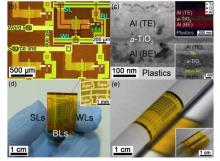Researchers from the Korea Advanced Institute of Science and Technology (KAIST) developed new flexible non-volatile resistive random access memory (RRAM) on plastic. The team used memristors integrated with high-performance single-crystal silicon transistors.

This is the first time such a flexible memory is achieved. Bending memory cells causes cell-to-cell interference. To solve this problem, you have to integrate transistors. But most transistors built on plastic substrates (organic/oxide transistors) are not capable of achieving the sufficient performance level with which to drive conventional memory. The new single-crystal silicon transistors used by KAIST solve this issue.
Source:
Posted: Nov 05,2011 by Ron Mertens